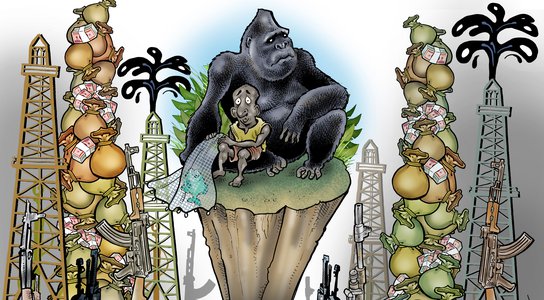As the easier-to-tap oil supplies in more traditional oil-producing regions have dwindled, more and more companies have shown a willingness to push into uncharted and remote areas.
So when the government of the Democratic Republic of Congo declared that parts of its Virunga National Park had been divided into oil blocks, international oil companies did not take long to react.
Two European companies – the French major Total and the London-listed Soco International – secured rights to explore for oil in blocks that overlapped the boundaries of Virunga. This quickly led to an international outcry.

The reason for the outrage is that Virunga is Africa’s oldest and most biodiverse national park. It contains savannah, rainforest, active and dormant volcanoes and most of one of Africa’s great lakes. It is, moreover, home to around 220 of the critically endangered mountain gorillas – about a quarter of the world’s remaining population. All of this is recognised in the fact that Virunga is a UNESCO World Heritage site, the same level of protection as Yellowstone National Park or the Great Barrier Reef. UNESCO says that oil activities in the park are incompatible with World Heritage status.
In June 2013, Total responded to calls to protect Virunga by promising to refrain from any oil activities within the current boundaries of the park. Soco has made no such promise.
In June 2014 Soco released a joint statement with conservationist campaigners WWF, following mediation by the OECD, in which the company promised to halt its work in Virunga once seismic testing had been completed. Despite the announcement being greeted by WWF and others as a victory for the park, the wording left Soco scope to relaunch oil operations in the event that “UNESCO and the DRC government agree that such activities are not incompatible with its World Heritage status.”Global Witness said at the time that the statement “looks like a ruse.”
The BAFTA- and Oscar-nominated documentary ‘Virunga’ helped to expose unsavoury practices carried out by Soco, its contractors and representatives in the course of its work in the park. Global Witness used footage from ‘Virunga’, unseen footage provided by the filmmakers, and its own research to publish a catalogue of damning accusations against the company in its report ‘Drillers in the Mist’.
Global Witness’ report reveals that Soco and its contractors have made illicit payments, appear to have paid off armed rebels and benefited from fear and violence in eastern Congo as they sought access to Virunga for oil exploration.
Undercover footage in ‘Virunga’, testimony gathered by Global Witness and other organisations, including Congolese NGOs and Human Rights Watch, show that Soco’s allies in the Congolese military and parks authorities have offered bribes and been implicated in acts of intimidation against anti-oil activists. There is also evidence that Soco paid a local MP, who was at the time a government minister, to campaign on their behalf. The MP even helped organise payments to local organisations to hold a pro-oil demonstration in the park.
A Congolese anti-oil activist told British parliamentarians, during a visit to London in December 2014, that “every day brings the threat of death”. The chief warden of Virunga was shot in April 2014, though not fatally, by unknown gunmen shortly after delivering a dossier on Soco’s activities to the public prosecutor in the provincial capital, while conservation activists received anonymous death threats by text message and phone call.
Soco has denied any involvement in these horrendous acts, and says that it “does not condone, partake in or tolerate corrupt or illegal activity whatsoever”.
Soco representatives were caught on undercover camera by the filmmakers talking dismissively about the park and the need to protect the gorillas, one security contractor saying “Who gives a fuck about a fucking monkey”. The same representatives also suggest that Soco’s contractors may have paid money to armed rebel groups in Virunga in order to have access to the area.
Since this evidence has come to light some of Soco’s shareholders have expressed concern at the behaviour of the company, its contractors and representatives in Virunga. In February 2015 the Church of England, which owns £3 million of Soco shares, issued a strong statement calling for an independent inquiry in Soco’s Virunga operations. It also demanded a new commitment from the company to permanently end its operations in Virunga, within the existing boundaries of the park.
Global Witness research into Soco’s previous oil operations in central Africa provides further cause for alarm. Soco was mired in controversy in 2005 in the Democratic Republic of Congo’s neighbour, Congo-Brazzaville, when it held a controlling stake in an offshore oil block. Another private company was awarded a 10% share of the block, but a UK court showed that this company was owned by a presidential adviser who was also the head of the national oil company, and therefore in charge of the oil block bidding process.
Another offshore company, British Virgin Islands’ registered Quantic Ltd, received a 15% stake of Soco’s operation in Congo and is paid a $50,000 monthly consulting fee, apparently in return for Quantic’s assistance in securing the oil rights. Soco annual reports revealed one part-owner to be Rui de Sousa: Soco’s own chairman. The nature of the assistance provided by Quantic is unclear, as are Quantic’s other owners, which constitutes a serious corruption red flag.
Given Soco’s history in Congo-Brazzaville and the brazen attitude displayed by its representatives on the ground in the ‘Virunga’ film, Global Witness is calling on the company to launch a full and independent investigation into its activities in Virunga. Soco should follow Total’s lead in promising never to work inside Virunga, to respect the park’s current boundaries and to not sell on the oil rights to another company.
Global Witness is also calling on the relevant authorities in the UK and the US to launch investigations into the allegations of bribery and intimidation, to determine whether the company has acted illegally.

